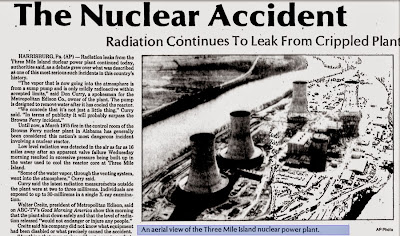Out of the identified 33 serious, major incidents and accidents at nuclear power stations. The first recorded was one in 1952 at Chalk River in Ontario, Canada. On March 28,1979, not the first of manny but this being the worst ever recorded in the nuclear power industry being started with the faulty pressure valve failing to close inside a Unit-2 reactor, a malfunction in the cooling reactor of the nuclear plant and causing one of the reactors, The TMI-2 reactor to be destroyed in the accident. which horrified everyone knowing the past mistakes with nuclear power and radioactivity. What happens like said on a history page on the accident. “Cooling water, contaminated with radiation, drained from the open valve into adjoining buildings, and the core began to dangerously overheat.”
The nuclear power plant being built in near Harrisburg, Pennsylvania in the USA, brought, even more, attention because the side effects and outbreaks it caused to people and the environment, luckily this brought no detectable health effects on plant workers or the public. The power plant reactors became most known and not complained about because it brought affordable and reliable energy in a time of energy crises. Which eased people's tensions on this nuclear danger. This turned out to be a very close call until came the human operators, clean up crew, trying to fix the situation with the safety devices that were supposed to prevent it from becoming a bigger problem IF PROPERLY USED. But due to a misunderstanding during the procedure and human error at not the best timing, like inscribed in an article on the history of the incident saying, “human operators in the control room misread confusing and contradictory readings and shut off the emergency water system. The reactor was also shut down, but residual heat from the fission process was still being released. By early morning, the core had heated to over 4,000 degrees, just 1,000 degrees short of meltdown. In the meltdown scenario, the core melts, and deadly radiation drifts across the countryside, fatally sickening a potentially great number of people.” This was an even closer call because people were almost in a life-threatening situation where they could be contaminated with radiation and having horrific sickening and side effects. Being, even more, luckier there were no injuries or harmful major health effects from the Three Mile Island accident.
As a result of the minor consequences, this was a highlight to the “Federal and state authorities were initially concerned about the small releases of radioactive gasses that were measured off-site by the late morning of March 28 and even more concerned about the potential threat that the reactor posed to the surrounding population. They did not know that the core had melted, but they immediately took steps to try to gain control of the reactor and ensure adequate cooling to the core.” Wanting to improve the Rapid Emergency response of workers, and the safety for accidents and liability when dealing with a problem like this was handled so that an accident much worse in the future won't occur. Enforce the rules and make sure operators are officially able to operate and understand what to do in the reactor having them all property and making sure the were well trained in handling the fission having to do with the reactors. This lead people to lose faith in the US nuclear plant system which leads to the closing of the 1-Unit reactor as well even though it consisted of some harm but was fixable. For the next two decades, no orders for new nuclear power plants were put into place because of this in the United states.
.

Interesting post on the Three Island Nuclear Plant and its benefits on the local area it provided for. One interesting thing to think about is what, if a complete meltdown of the plant were to occur and consequently release radioactive material into the environment, government local/state/federal would have called for into action.
ReplyDeleteThis is an cool article. It is weird that the people that were sent in to clean up and fix it actually made it worse by not following the directions. I would figure that they need to have a permanent crew that now exactly what to do. It could save lives.
ReplyDelete